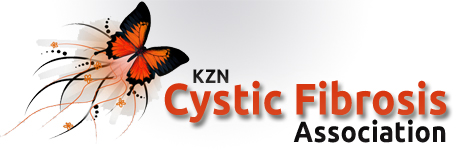Genetic Testing & Counselling
Cystic fibrosis is a genetic disease, inherited in an autosomal recessive manner. This means that affected individuals have a mutation in each of the two copies of the CFTR gene and that each parent of a child with CF is a carrier of one abnormal CF gene, but is individually healthy. When a child with CF is diagnosed, there is often no history of CF in either the mother's or father's families. The altered CFTR gene can be passed down in families in the carrier form for many generations without being detected.
In South Africa approximately 1 in 20 individuals in the white population, 1 in 55 in the population of mixed ancestry and up to 1 in 90 black Africans carry a CFTR mutation. Statistically it would be expected that 1 in every 2000 white babies, 1 in every 12 000 babies of mixed ancestry and up to 1 in every 32 000 black African babies should be born with CF. If a couple has a child affected with CF, each subsequent pregnancy that they have together has a 1 in 4 chance of producing a fetus/baby with CF. The parents are called obligate carriers of a faulty gene for CF (see diagram below).
Autosomal recessive inheritance of the faulty gene for CF, showing a 1 in 4 chance of having an affected child with every pregnancy

The CFTR gene has been identified on the long arm of chromosome number 7. More than 1800 different mutations have thus far been described. A mutation is a mistake or change in the DNA sequence of a gene that causes it to be unable to function correctly.
- The most common mutation in the white population and in the population of mixed ancestry ('coloured') in South Africa is the ΔF508 mutation.
- The most common in the black African population is the 3120+1G→A mutation.
It is important to know which mutation/s is/are present in a family with CF, especially when a sibling or other family members are planning their own families. If an individual tests positive for CF carrier status, their partner should also be tested to assess their risk of having a child with CF. Even if the specific mutation is not known within a family, it may be possible to predict who the carriers are by doing specialised tests. People who are unrelated to a person with CF may also be tested for CF carrier status and the majority of carriers will be detected. A blood sample is required for these tests.
In each population group, the distribution of the CF-causing mutations is different. Using the ΔF508 test only, about 80% of white carriers and 65% of carriers of mixed ancestry will be identified. It is estimated that approximately 46% of black African CF carriers will be detected using the 3120 +1G A test. Patients with CF and their relatives have an increased risk of producing a child with CF when they have children.
Other individuals who may be at increased risk for having children affected with CF include more distantly related family members and couples from consanguineous marriages (marriages between related individuals). These individuals may be tested for CF mutations. In clinics for adults with CF, both CF patients and their children seem to be in favour of utilising the information available from genetic screening to guide reproductive choices.
To find out risks of having a child affected with CF, it is recommended that CF affected individuals and their families see a genetic counsellor in order to accurately calculate risks to family members.

